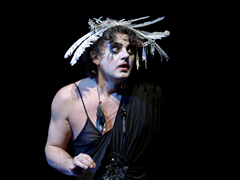| Opera Reviews | 28 April 2024 |
A powerful double billby Moore Parker |
|
| Britten: Curlew River Britten: The Prodigal Son Neue Oper Wien 25 March 2013 |
|
|
In this pre-Easter duo of Benjamin Britten's Curlew River and The Prodigal Son, the intimate framework of the Wiener Kammeroper proved an excellent choice for two gutsy settings, simply exposing the innards of the on-stage machinery and proving most effective despite a couple of minor technical hitches. Oversized masks, carton cutouts, and hand-propelled gulls on wire supports, are just a few of the elements hinting at traditional Japanese Noh Theatre. Carlos Wagner (direction) and Christof Cremer (sets and costumes) have created a powerful double bill with an excellent cast in which the three vocal leads serve in both works. In general the English enunciation was exemplary and homogenous - and presumably evidence of the wise decision to recruit the experienced British singer, Stephen Chaundy, as coach for the non-mother tongue cast. The evening opened with Curlew River with the action focussed on a simple rolling runway to serve as the ferry (rope-drawn to-and-fro by male pilgrims flanked on either side of the stage), and as the dead child's resting place which has become a shrine for the local population. Peter Edelmann (The Ferryman) towers over the proceedings - an almost Wotan-like figure who recounts the tale of the abducted boy, left to die by his kidnapper. The victim transpires to be the lost son of the Madwoman, whose search is now ended by the tragic realization of her son's fate. The Madwoman's entrance is preceded by the arrival of the Traveler, crushed physically (in contrast to the mental anguish of the Mother) by his backpack burden in a nicely-rounded portrayal by Sebastian Huppmann. In Noh Theatre tradition, Britten opted for an all-male cast in his score and tailored the Madwoman for Peter Pears, who created the role in 1964. Alexander Kaimbacher brings all the vocal and dramatic propensity required to this testing part with his imposing range of vocal colours and dynamics, in addition to an idiomatic sense of style. Stephan Rehm led the chorus of Pilgrims with refined authority, and Leonid Sushon presented a confident Child, who appears briefly clad in white under falling snowflakes to leave behind his small glove for his mother as testament to his appearance from the Afterworld, and with promise of a future reunion. The Prodigal Son capitalized through wonderfully expressive white masks to define the essential characteristics of the leads and with card cutouts to depict the variety of characters who appear on the Son's journey of experience. All the protagonists not only transported their vocal message with clarity and effect, but impressively utilized their body language to create larger-than-life figures which were absolutely convincing. Here the cast is augmented by the Younger Son winningly-portrayed by Gernot Heinrich, who possesses the appropriate vocal lightness and dexterity to contrast with his alter ego and Tempter - depicted here through Alexander Kaimbacher's spectrum of more worldly and (at times) bitingly-aggressive tone. Peter Edelman portrays the wise and benevolent father with true nobility and finesse, and Sebastian Huppmann is an equally-impressive asset to the cast as the Elder Son. Excellent utilization of the adept Wiener Kammerchor, who switch between male and female figures with their enticing blood-red finger extensions, giant gambling cards, or as bloated drinking companions to augment the white-chalked sketches of the Tempter along the wall-to-wall blackboard to illustrate his repertoire of "lessons" and which ultimately point to "home", as the Son realizes the folly of his ways. Strong contributions too from the Mozart Knabenchor Wien, and amadeus ensemble-wien under the musical direction of Walter Kobera. |
|
| Text ©
Moore Parker Photo © Armin Bardel |

 The
Neue Opera Wien has an established niche in the Austrian capital with
their focus on 20th and 21st century works and without a commitment
to any set venue, and with the obvious advantage of variety in staging
options.
The
Neue Opera Wien has an established niche in the Austrian capital with
their focus on 20th and 21st century works and without a commitment
to any set venue, and with the obvious advantage of variety in staging
options. 





